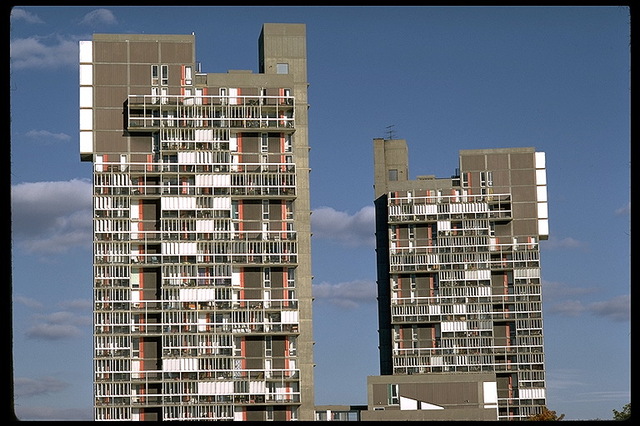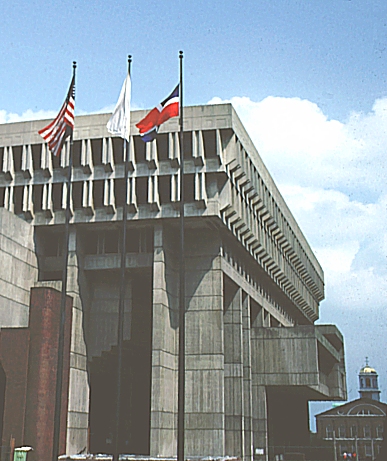Sorry to Send You To Harvard With Unhappy Thoughts
I was looking at the searches that brought visitors to Coyote Blog, and in August and early September I had a surge of folks searching Peabody Terrace. This seemed odd. Then I realized that this must be young grad students who have been assigned Peabody Terrace as their housing and want to learn about it. I feel bad that I have to spoil some of their anticipation, but this is what they will find on my site:
And, in case you are one who supports government "redevelopment" and mandates on aesthetics but think that it would all work out fine if architectural experts and committees of academics made the decisions, here is the hideous Peabody Terrace at Harvard University, presumably vetted by the finest architectural academic minds in the country:
These buildings, where Harvard stuck me for a full year, were transported right out of East Berlin, right down to the elevators that only stopped on every third floor for efficiency sake (efficiency of the builder, obviously, not the occupant). The interior walls were bare cast concrete and no amount of heat could warm them in the winter. It was the most depressing place, bar none, I have every lived. But the "experts" loved them, and wished that this vision could have been forced by urban planners on all of America:
Leland Cott, an adjunct professor of urban design at the [Harvard] GSD, calls Peabody Terrace 'a model of design efficiency, economy, and attention to scale.'
Fortunately, someone gets it:
The magazine Architecture Boston has focused attention on the controversial aspects of Sert's work by devoting its July/August 2003 issue to an examination of Peabody Terrace, expressing the essential disagreement about the work in the form of a stark conundrum: "Architects love Peabody Terrace. The public hates it."
In fact, the public's hostility to the structures may be in proportion to its degree of proximity, with the most intense feelings confined to those households on the front lines of the town/gown divide....
Otile McManus, in a companion essay, discusses the reactions of many Cambridge residents, who have described the complex as "monstrous," "cold," "uninviting," "overwhelming," and "hostile," and have compared it to Soviet housing.
Actually, the most intense feeling were by those who lived there, who really, really hated it (though I will admit there were several third world students who loved it -- must have been nostalgic for them). The article goes on to accuse detractors of being anti-modernist. Which is a laugh, since my house is one of the most starkly modern in the area, so modern I could not sell it several years ago. I am not anti-modern. I am anti-bad-design.
Wow! I am kindof amazed at the hostility I still feel fifteen years after the fact. I had started out just to link TJIC's post, and here I am in full-blown rant mode. Sorry.
A blogger once described the Boston City Hall as "a poured concrete Vogon love poem." I wish I had said that about Peabody Terrace.
The other thing excited, young Harvard grad students might find at my site is an excerpt from my novel. This portion is entirely autobiographical (except for not being a girl) and describes my year at Peabody Terrace.

